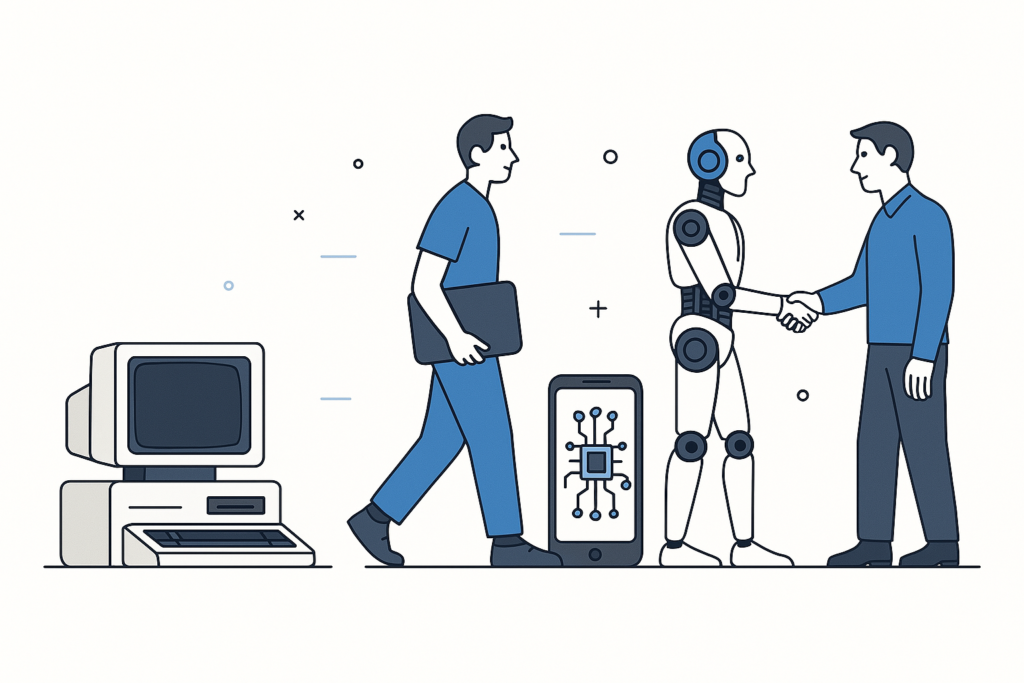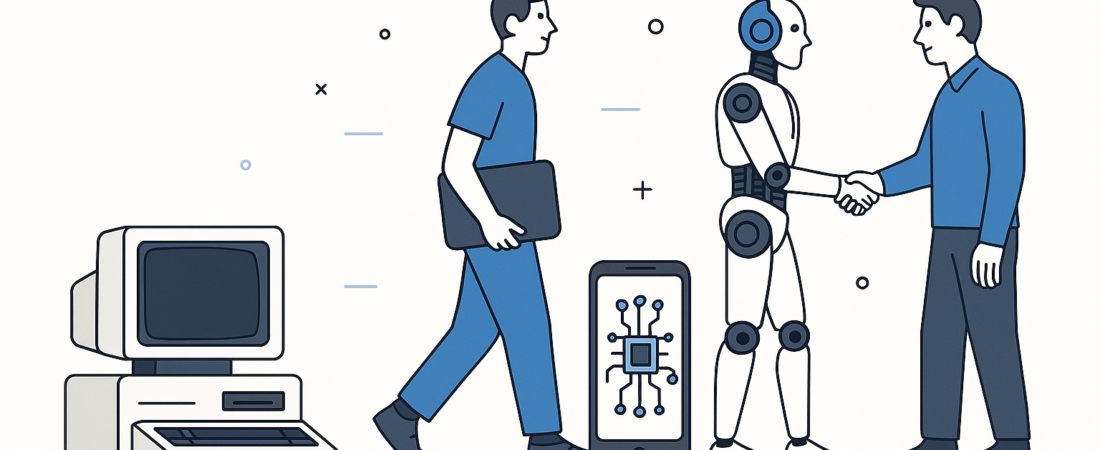Introduction to AI Content Creation
The rapid development of artificial intelligence (AI) has transformed numerous aspects of daily life, and one of the most significant areas of impact is content creation. AI content creation refers to the use of AI tools and algorithms to produce written, visual, or multimedia content with minimal human intervention. This growing field has captured the interest of various industries, including marketing, journalism, entertainment, and education, due to its potential to enhance efficiency and creativity.
Current AI tools have demonstrated remarkable capabilities in generating high-quality content, enabling businesses and content creators to streamline their workflows. By leveraging machine learning algorithms and natural language processing, these tools can analyze vast amounts of data and identify trends to create relevant and engaging content. This innovation not only allows for the rapid generation of articles, blog posts, and social media updates but also provides personalized content tailored to individual user preferences.
The significance of AI content creation lies in its ability to support human creativity rather than replace it. By handling repetitive tasks and providing insights into audience behavior, AI can free up content creators to focus on more strategic initiatives, such as crafting original ideas and refining their messaging. Moreover, the ongoing integration of AI into daily life signals a shift in how we approach content creation, with tools that adapt to evolving consumer needs.
As we move forward, it is essential to consider the ethical implications and potential challenges that may arise from the use of AI in content generation. There are concerns regarding content authenticity, bias, and the potential for misinformation. Addressing these issues will be crucial for the responsible development and deployment of AI technologies across various sectors. Overall, the future of AI in content creation holds immense promise, presenting opportunities for innovation and improved efficiencies that can enrich our daily lives.
The Evolution of AI Technologies
The evolution of artificial intelligence (AI) technologies has been marked by significant milestones that have progressively transformed its capabilities, particularly in content creation. The journey began in the mid-20th century when pioneers like Alan Turing and John McCarthy laid the groundwork by proposing theoretical frameworks for machine intelligence. Turing’s introduction of the Turing Test set a standard for evaluating a machine’s ability to exhibit intelligent behavior indistinguishable from that of a human.
In the 1980s, the advent of expert systems allowed computers to mimic human decision-making processes, leading to their application in fields such as finance and healthcare. This period marked the initial use of AI tools that could analyze data and generate content based on predefined rules, albeit in a limited manner. The emergence of machine learning in the 1990s further altered the landscape, enabling systems to improve their performance by learning from data. This innovation laid the foundation for the modern AI we employ today.
With the introduction of deep learning in the 2010s, AI technologies experienced an exponential leap in capability. Deep learning algorithms, often structured as neural networks, allow machines to analyze vast amounts of unstructured data. This advancement has empowered AI in content generation, enabling it to produce texts, images, and even videos with remarkable proficiency. As a result, we now witness the seamless integration of AI in daily life, from personal assistants that understand context to AI-driven platforms that generate engaging articles.
Looking ahead, the potential for further advancements in AI content creation appears promising. With ongoing research in areas such as reinforcement learning and natural language processing, the capabilities of AI tools are expected to evolve, becoming more autonomous and context-aware. Such developments could significantly enhance the use of AI in various sectors, making content creation not only more efficient but also more tailored to individual needs. Ultimately, the progression of AI technologies holds the key to a future where AI plays an integral role in our everyday lives.
Current Trends in AI Content Creation
The landscape of AI content creation has evolved significantly in recent years, with advanced technologies reshaping how content is generated and consumed. Among the most prominent trends is the rise of personalization in content delivery. AI tools are now capable of analyzing user data to tailor content specifically, enhancing engagement and relevance. Platforms like Netflix and Spotify utilize sophisticated algorithms that learn from user interactions, recommending content that aligns with individual preferences, thus optimizing the user experience.
Another key trend is automated writing. The use of AI in crafting articles, blogs, and even news summaries is becoming more common. Tools such as OpenAI’s GPT-3 have demonstrated remarkable proficiency in generating human-like text, transforming the way content is produced. Businesses are increasingly adopting these AI solutions to streamline their content workflow, reduce costs, and maintain a consistent output. This has allowed content creators to focus on more strategic and creative aspects of their work, leaving repetitive tasks to AI.
Data-driven content strategies are also on the rise, leveraging AI’s analytical capabilities to inform and shape content creation. By analyzing vast amounts of data, AI tools can provide insights into trending topics, optimal posting times, and audience engagement metrics. This enables content creators to develop strategies that resonate with their target audiences based on real-time data, enhancing the effectiveness of their messaging.
Platforms such as BuzzSumo and HubSpot are leading the charge in this domain, offering robust analytics and content optimization tools that highlight the importance of a data-backed approach. As AI in daily life continues to develop, the implications for content creators and businesses are profound. Embracing these trends allows for a more targeted and efficient content creation process, ultimately leading to higher engagement and successful outcomes.
The Role of Machine Learning and Natural Language Processing
Machine learning (ML) and natural language processing (NLP) are at the forefront of AI tools that are revolutionizing content creation. These advanced technologies empower artificial intelligence to analyze vast amounts of data and learn patterns that help it generate relevant and engaging content tailored to the user’s needs. By leveraging ML algorithms, AI can continually refine its understanding of context, tone, and specific user preferences. As a result, the interaction between users and AI in daily life becomes more seamless and intuitive.
NLP specifically focuses on the interaction between computers and humans through natural language. With the ability to comprehend context and semantics, NLP enables AI systems to interpret user input more accurately, whether in written or spoken forms. This understanding allows AI to produce text that is not only grammatically correct but also resonates with the intended audience. For instance, businesses can utilize these AI tools to craft marketing content that aligns with customer preferences, enhancing engagement and conversion rates.
Moreover, the application of machine learning models enhances the quality of AI-generated content by enabling continuous improvement. As these models are exposed to more data, they adapt and evolve, leading to more refined outputs. This adaptability is particularly valuable in diverse fields, such as journalism, where staying current with trends and audience sentiment is critical. By utilizing AI in daily life contexts, organizations can ensure that their content remains relevant and impactful, fostering a stronger connection with their audience.
In conclusion, the convergence of machine learning and natural language processing is vital for the advancement of AI in content creation. The enhanced understanding of user context and preferences allows for the generation of tailored solutions that are more relevant, engaging, and capable of meeting the dynamic needs of users today.
Impact on Content Creators and Marketers
The advent of advanced AI tools has significantly influenced the landscape of content creation and marketing. As artificial intelligence continues to evolve, its implications are profound for both content creators and marketers. One of the key benefits of leveraging AI in daily life is the enhancement of productivity. AI tools can automate repetitive tasks such as editing, keyword research, and content optimization, allowing professionals to devote more time to strategic planning and creative work. This shift not only streamlines the content creation process but also improves the quality and relevance of the output.
However, the rise of AI in content generation has given rise to concerns about job displacement within these fields. Many professionals fear that AI content creation technologies may render certain roles obsolete. While it is true that some tasks may become automated, it is essential to recognize that AI is designed to augment human capabilities rather than replace them entirely. By embracing the use of AI, content creators can elevate their craft and improve their effectiveness in reaching target audiences. AI tools can provide valuable insights into consumer behavior, enabling marketers to create personalized experiences that resonate with their audience.
The integration of AI into content strategies encourages collaboration between human creativity and technical efficiency. By utilizing AI-generated data analytics, professionals can refine their tactics and enhance engagement. Moreover, AI can assist in the ideation process, suggesting topics and themes that align with current trends. Consequently, rather than viewing AI as a competitor, creatives and marketers should approach it as a powerful ally. As the landscape of AI content continues to advance, the most successful professionals will be those who adapt and integrate these technologies into their workflows to enhance their creative output.
Ethical Considerations in AI Content Creation
The advent of AI tools in content creation has opened up new avenues for efficiency and innovation. However, this rapid development also raises critical ethical considerations that must be addressed to ensure responsible use. One of the central issues is content authenticity. As AI systems become increasingly capable of generating text and multimedia content indistinguishable from human-generated work, questions arise about the originality and provenance of the digital material consumed by audiences. It becomes imperative for both creators and consumers to discern whether content is produced by a human or an artificial intelligence system, emphasizing the need for transparency in disclosure.
Moreover, copyright concerns have become prominent with the rise of AI-generated content. The legal framework regarding ownership and attribution of works produced by AI remains murky. When AI tools generate content based on existing works, issues of intellectual property rights may emerge, as the line blurs between inspiration and plagiarism. Creators must navigate these complexities to avoid legal ramifications while leveraging the advantages of AI in daily life.
Misinformation is another significant ethical concern associated with AI-generated content. The potential for AI to produce misleading or false information raises alarm bells. The responsibility lies with developers and creators to implement safeguards against the proliferation of inaccurate content, considering the far-reaching effects on public opinion and knowledge. It is essential to cultivate a culture of accountability in the use of AI, where the consequences of disseminating false information are thoroughly understood.
In summary, while the integration of AI in content creation offers immense potential, it necessitates careful consideration of ethical implications. Establishing guidelines and best practices can help navigate the challenges presented by AI tools, ultimately fostering a responsible approach to AI content creation.
AI Content Personalization and User Experience
The rapid advancement of AI tools has begun to fundamentally transform how users interact with content across various platforms. One of the most significant developments in this domain is the increasing ability of AI content personalization to enhance user experiences. By leveraging sophisticated algorithms and data analytics, AI can tailor content delivery based on user preferences, behaviors, and demographics. This capability not only elevates the relevance of the content presented but also significantly boosts engagement rates.
Personalized content, enabled by the use of AI in daily life, serves multiple functions that cater to both users and businesses. For users, receiving content that resonates with their individual interests creates a more meaningful interaction. Whether it’s through customized recommendations on streaming services or personalized marketing messages that address specific needs, the adoption of AI technologies ensures that the content feels relevant and timely. This level of personalization fosters customer loyalty, as users are more likely to return to platforms that provide a tailor-made experience.
From a business perspective, the ability to utilize data analytics to refine content strategies is invaluable. Companies can analyze vast amounts of data to discern patterns and preferences within their audience, allowing them to create AI-driven content that not only attracts but holds the attention of their target market. The integration of AI solutions aids in constructing user profiles that are continuously updated based on interactions and feedback. This ongoing adaptation enhances the personalization of content, making it increasingly pivotal in maintaining competitive advantage.
As advancements in AI technology continue to unfold, the implications for user experience and engagement will only expand. The evolving landscape of AI content personalization signifies a shift toward more automated and responsive interactions in digital environments, ultimately redefining how individuals consume and connect with content.
Future Predictions: What to Expect from AI Content Creation
The evolution of AI tools has ushered in a new era in content creation, and the future promises even more remarkable advancements. As machine learning algorithms continue to improve, we can expect AI to create content that is not only more sophisticated but also more personalized. Future iterations of AI in daily life may involve highly contextual and adaptive content generation that caters to individual preferences, thus redefining user engagement.
One significant trend on the horizon is the integration of augmented reality (AR) and virtual reality (VR) with AI content. As these technologies converge, we will likely see immersive experiences that blur the lines between digital and physical environments. For instance, brands might utilize AI to create personalized AR experiences that provide users with tailor-made content based on their interactions, preferences, and locations. This could fundamentally alter how consumers interact with products and services, creating a more interactive form of storytelling that engages audiences at deeper emotional levels.
Furthermore, industries such as marketing, education, and entertainment are predicted to be significantly transformed by the enhanced capabilities of AI. In marketing, AI tools could automate and optimize content delivery, ensuring that the right message reaches the right audience at the right time. In education, AI-driven content could facilitate personalized learning experiences, helping students grasp concepts at their own pace through targeted resources and guidance.
Consumer behavior is poised to shift as well, with expectations for instant, relevant content likely to escalate. Users will come to anticipate a seamless blend of AI-generated and human-created content, where the use of AI enhances creativity rather than replacing it. As the synergy between human insight and AI automation continues to develop, the possibilities for innovation in content creation are virtually limitless.
Conclusion: Embracing the Future of AI in Daily Life
The transformative impact of artificial intelligence and its various tools is becoming increasingly evident in our daily lives. From personalized recommendations on streaming platforms to chatbots providing instant customer support, the integration of AI is reshaping how we interact with technology and the world around us. AI content creation, in particular, stands out as a key player in this evolution, enhancing efficiency and creativity across multiple sectors.
As we move into a future where AI tools become more sophisticated, it is crucial for individuals and businesses alike to adapt to these advancements. By embracing the use of AI, users can harness its potential to streamline tasks, enhance decision-making processes, and ultimately create more valuable content. The incorporation of AI into our daily life not only empowers us with improved productivity but also allows for greater innovation in creative pursuits, be it in marketing, education, or content development.
The inevitability of technological evolution means that resistance to these changes can be counterproductive. Instead, it is more beneficial to view AI as a partner in development—one that complements human skills rather than replaces them. By integrating AI content strategies into our routines, we position ourselves to thrive in an increasingly digital environment. To adapt effectively, individuals can seek training in AI technologies, attend workshops, and keep abreast of industry trends to ensure they remain relevant.
In conclusion, the future of AI in daily life is not just a distant vision; it is an unfolding reality. By recognizing the value of AI tools now, we can better prepare ourselves for a future where technology and human ingenuity come together to foster new opportunities and enhance our quality of life. Embracing these changes will undoubtedly lead to a more interactive, efficient, and enriched existence.


